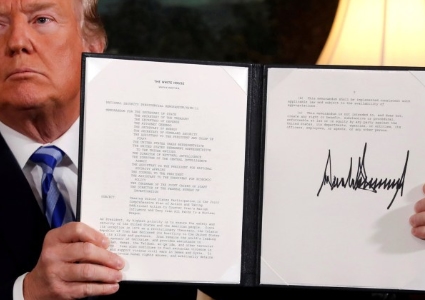Polling

Suggest an important issue not listed in this sub-category (). (Maximum 60 Characters)
Iran sanctions

Over the years, the United Nations and Western countries have imposed many economic sanctions on Iran. We enacted sanctions following the 1979 hostage crisis and expanded them in 1995. In 2006, the UN imposed sanctions after Iran refused to abandon its nuclear enrichment program. These sanctions restricted bank transactions, prohibited petroleum exports and blocked business dealings with Iranian individuals and its Revolutionary Guard Corps. These sanctions, and others, took a heavy toll on Iran’s economy and its people, but it still refused to curtail its nuclear program, claiming it is needed for medical purposes and electricity generation.
In 2015, the United States, the European Union, the United Kingdom, Russia, France, Germany and China signed the Joint Comprehensive Plan of Action. Known as the Iran Nuclear Deal, it called for Iran to dismantle much of its nuclear program and gave international inspectors extensive access to its facilities in exchange for relief from economic sanctions. However, in 2018 the Trump administration unilaterally withdrew the U.S. from this agreement and re-imposed sanctions, saying Iran failed to address its ballistic missile program and its role in regional wars – issues the Iran Nuclear Deal was never intended to address. Iran responded by increasing its stockpile of enriched uranium to more than five times the limit fixed under the Iran Nuclear Deal, and has halted international inspections of its nuclear facilities – putting it back on track to develop nuclear weapons. However, the Biden administration has recently entered into negotiations to re-enter the Iran Nuclear Deal.
Proposed Legislation: Reintroduction of S.434 - Iran Diplomacy Act of 2021
Prospective Sponsor: Sen. Edward Markey (MA)
In 2015, the United States, the European Union, the United Kingdom, Russia, France, Germany and China signed the Joint Comprehensive Plan of Action. Known as the Iran Nuclear Deal, it called for Iran to dismantle much of its nuclear program and gave international inspectors extensive access to its facilities in exchange for relief from economic sanctions. However, in 2018 the Trump administration unilaterally withdrew the U.S. from this agreement and re-imposed sanctions, saying Iran failed to address its ballistic missile program and its role in regional wars – issues the Iran Nuclear Deal was never intended to address. Iran responded by increasing its stockpile of enriched uranium to more than five times the limit fixed under the Iran Nuclear Deal, and has halted international inspections of its nuclear facilities – putting it back on track to develop nuclear weapons. However, the Biden administration has recently entered into negotiations to re-enter the Iran Nuclear Deal.
Proposed Legislation: Reintroduction of S.434 - Iran Diplomacy Act of 2021
Prospective Sponsor: Sen. Edward Markey (MA)
Poll Opening Date
November 4, 2024
Poll Closing Date
November 10, 2024
Democracy Rules respects the privacy of your information.
See PRIVACY STATEMENT
See PRIVACY STATEMENT